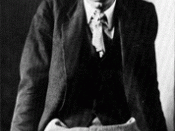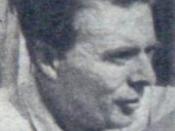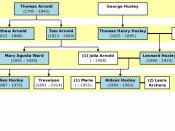Brave New World: A Study of Dehumanization
Universal happiness is one of the most sought-after goals for mankind. "Brave
New World" by Aldous Huxley portrays a world that has, for the most part, achieved
universal happiness. This novel presents a startling view of the future which, on the surface,
appears idealistic. Deep down, though, this world is very dark: it has stripped its people's
freedom, yet the society not only lives in this totalitarian government, but also embraces it like
mindless robots. "Huxley's future describes a world without pain and a world without soul" (Clark 15). The leaders of this utopia have replaced freedom with their version of
happiness. Through examining this utopian society's absence of individuality, their concept of happiness, and their lack of family, it is obvious that technology has not improved life,
despite the fact that there are no wars or poverty.
In London in the year 632 A.F.,
an ideal society was one with little variation within the masses. "This world is centered around control and manipulation. The fate of an individual depends on the interplay of Nature and Nurture, heredity and environment: but the utopian state apparatus controls both" (Coren 2). The leaders achieved this by producing people with very little differences, yet there was always the exception. The ones that are intelligent enough to be against this system of oppression were sent to live on islands, but the rest of the citizens are all alike or equal, and there are no differences apart from the superficial ones between them. They all act same and they do not decide or think by themselves. People's minds are what make everyone different, but the minds of the citizens of this utopian world are all the same: they all have one mind that the state has built in...



Very good
awesome essay, could be very useful
2 out of 3 people found this comment useful.